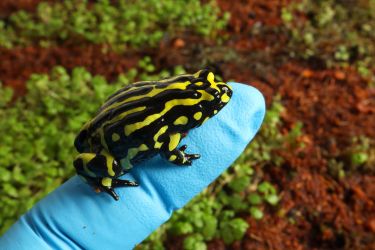Extinction

Sciences & Technology
Research
By sequencing the genome of the endangered Southern Corroboree Frog, we could save it
For the first time, the genome of the Southern Corroboree Frog has been sequenced – a major milestone in efforts to conserve this critically endangered species

Sciences & Technology
What five thylacine skulls can tell us about extinction
The Tasmanian tiger is extinct. The only specimens are in museums, but it’s amazing what five thylacine skulls can still tell us

Sciences & Technology
A biobank freezes Australian species for the future
By freezing the cells of living animals, researchers and museums are working together to safeguard Australia’s wildlife

Sciences & Technology
Captive breeding to prevent extinction
New research into the embryo health of captive bred Southern Corroboree frogs may help their survival and guide conservation efforts

Sciences & Technology
Piecing thylacine DNA back together
New research is using genomes from living thylacine relatives to build a new, chromosome-scale genome for the de-extinction of the Tasmanian tiger

Sciences & Technology
The 9 steps to de-extincting Australia’s thylacine
The reality of bringing back the Tasmanian tiger from extinction using its genome is now a step closer, but how will science make it happen?

Environment
Saving aquatic insects: We may be looking in the wrong place
Our aquatic insects are at risk of extinction but in understanding why we may need to be looking beyond the quality of the water

Sciences & Technology
Human-driven evolution threatens fish stocks
Warming oceans and overfishing is causing species to evolve in ways that threaten the sustainability of commercial fisheries

Sciences & Technology
Using genetics to conserve wildlife
Conserving wildlife with breeding programs doesn’t help threatened species to adapt, but synthetic biology may be able to bring protection by adapting genetics

Sciences & Technology
Mini-beast renaturing: A time for local action
Insect numbers are dwindling around the world and that has an ecological knock-on effect, but we could help by renaturing mini-beasts in our own urban backyards